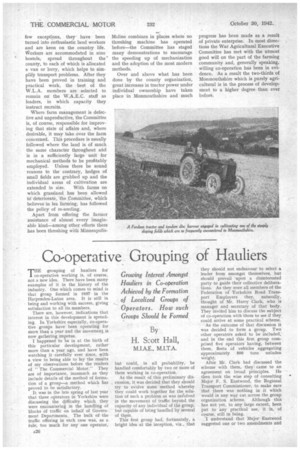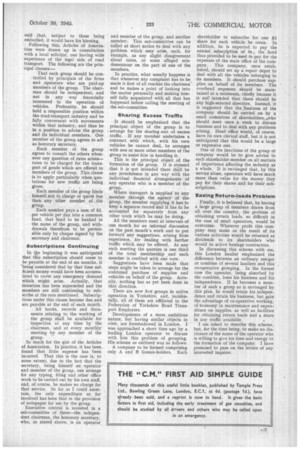Co-operative Grouping of Hauliers
Page 28

Page 29

If you've noticed an error in this article please click here to report it so we can fix it.
Growing Interest Amongst Hauliers in Co-operation Achieved by the Formation of Localized Groups of Operators. How such Groups Should be Formed
By H. Scott Hall,
M.I.A.E., M.I.T.A. FrHE grouping of hauliers for .I. co-operative working is, of course, not a new idea. There have been many examples of it in the history of the industry. One which comes to mind is that group formed in 1937 in the Harpenden-Luton area. It is still in being and working with success, giving satisfaction to all its members.
There are, 'however, indications that interest in this development is spreading. In Yorkshire especially, co-operative groups have been operating for more than a year and the movement is now gathering impetus.
I happened to be in at the birth of this particular development, rather more than a year ago, and have been watching it carefully ever since, with a view to being able to lay the results of my observations before the readers of " The Commercial Motor." They are of importance, inasmuch as they include details of the method of formation of a group—a method which has proved to be satisfactory.
It was in the late spring of last year that three operators in Yorkshire were discussing the difkulty which they were encountering in the handling of blocks of traffic on behalf of Government Departments. The bulk of the traffic offering in each case was, as a rule, too much for any one operator,
but could, in all probability, be handled comfortably by two or more of them working in co-operation.
As the result of this preliminary discussion, it was decided that they should try to evolve some method whereby they could work together for the solution of such a problem as was ins..tolved in the movement of traffic beyond the capacity of any individual of the group, but capable of being handled by several of them.
This first group had, fortunately, a bright idea at the inception, viz., that
they should not endeavour to select a leader from amongst themselves, but should prevail upon a disinterested party to guide their collective deliberations. As they were all members of the Federation of Yorkshire Road Transport Employers they, naturally, thought of Mr. Harry Clark, who is manager and secretary of that body. They invited him to discuss the subject of co-operation with them to see if they could arrive at some practical scheme.
As the outcome of that discussion it was decided to form a group. Two other operators asked to be included; and in the end this first group comprised five operators having, between them, fleets of vehicles aggregating approximately 800 tons unladen weight.
After Mr. Clark had discussed the scheme with them, they came to an agreement on broad principles. He then took the wise step of consulting Major F. S. Eastwood, the Regional Transport Commissioner, to make sure that there was nothing in it which would in any way cut across the group organization scheme. Although this has not yet, to any large extent, been put to any practical use, it is, of course, still in being.
understand that Major Eastwood suggested one or two amendments and
said that, subject to these being embodied, it would have his blessing.
Following this, Articles of Association were drawn up in consultation with a local solicitor, one having wide experience of the legal side of road transport. The following are the principal clauses:—
That each group should be controlled by principals of the firms and operators who are paid-up members of the group. The chairman should be independent, and not in any way financially interested in the operation of vehicles. Preferably, he should hold a responsible position within the road-transport industry and be fully conversant with movements within that industry, and thus be in a position to advise the group and its individual members. One member of the group agrees to act as honorary secretary.
Each member of the group agrees to consult the others whenever any question of rates arises— rates to be charged for the transport of goods which are offered to members of the group. This clause is to apply particularly when quotations for new traffic are being given.
Each member of the group binds himself not to charge or quote less than any other member of the group.
Each member pays a sum of 3d. per vehicle per day into a common fund, that fund to be banked in the name of the group, and withdrawals therefrom to be permissible only by cheque signed by the secretary and chairman.
Subscriptions Continuing In the beginning it was anticipated that this subscription should cease to be payable at the end of six months, it being considered that by that time sufficient money would have been accumulated to cover any emergency demand which might arise. Actually, that intention has been superseded and the members are still continuing to subscribe at the rate mentioned. Subscriptions under this clause become due and are payable at the end of each month.
All books, records and docu ments relating to the working of the group shall be available for inspection at any time by the chairman, and at every monthly meeting by any member of the group.
So much for the gist of the Articles of Association. In practice, it has been found that little expense has been incurred. That this is the case is, to some extent, due to the fact that the secretary, being himself an .operator and member of the group, can arrange for any typing, filing and other office work to be carried out by his own staff, and, of course, he makes no charge for that service. So far as I could ascertain, the only expenditure so far involved has been that in the provision of notepaper for use by the group.
Executive control is invested in a sub-committee of three—the independent chairman, the honorary secretary, who, as stated above, is an operator and member of the group, and another member. This sub-committee can be called at short notice to deal with any problem which may arise, such, for example, as any slight disagreement about rates, or some alleged misdemeanour on the part of one of the members.
In practice, what usually happens is that whenever any complaint has to be made it first of all reaches the chairman and he makes a point of looking into the matter personally and making himself fully acquainted with all that has happened before calling the meeting of the sub-committee.
Sharing Excess Traffic It should be emphasized that the principal object of the group is to arrange for the sharing .out of excess traffic. If any member undertakes a contract with which, with his own vehicles he cannot deal, be arranges with one or more other members of the group to assist him in handling it.
This is the principal object of the formation of the group. It is stressed that it is not intended there shall be any interference in any way with the individual financial arrangements of any operator who is a member of the group.
Where transport is supplied to any member through the agency of the group, the member supplying it has to keep a separate record and it has to he accounted for separately from any other work which he may be doing.
All the members meet at intervals of one month for an informal discussion on the past month's work and to put forward any suggestions, arising from experience, for dealing with further traffic which may be offered. At any such meeting the quorum is one third of the total membership and each member is credited with one vote.
Suggestions have been made that steps might he taken to arrange for the combined purchase of supplies and vehicles on behalf of the group. Actually, nothing has as yet been done in that direction.
There are now five groups in active operation in Yorkshire, and, incidentally, all of them are affiliated to the Federation of Yorkshire Road Transport Employers.
Developments of a more ambitious nature, but having similar objects in view, are foreshadowed in London. I was approached a short time ago by a leading London operator to discuss with him this problem of grouping. His scheme as outlined was as follows:
A company to be formed comprising only A and B licence-holders. Each shareholder to subscribe for one 21 share for each vehicle he owns. In addition, he is expected to pay the annual subscription of Ss., the fund thus provided to be used to pay for the expenses of the main office of the company. This company, once established, should set up a repair depot to deal with all the vehicles belonging to its members. It should purchase supplies on behalf of its members. The overhead expenses should be maintained at a minimum, chiefly because it is not' intended that there should be any high-salaried directors. Instead, it is suggested that the ,business of the company should be carried on by a small committee of shareholders, „who should meet once a week to discuss business and to deal with any problems arising. Head office would, of course, have its own clerical staff, but it is not anticipated that this would be a large or expensive one.
One of the functions of the group or company would be to give advice to each shareholder-member on all matters of importance affecting the industry as a whole. It is envisaged that, by this service alone, operators will have much more than value for the money they pay for their shares and for their subscriptions.
Easing Return-loads Problem
Finally, it is believed that, by having a large group of members drawn from all over the country, the problem of obtaining return loads, so difficult in the case of small operators, would be overcome. Whatever profit this company may make as the result of its various activities would be returned as dividends to its shareholders who would be active haulage contractors.
In discussing this scheme with roe, this London haulier emphasized the difference between an ordinary merger or combine of several hauliers and this co-operative grouping. In the former case the operator, being absorbed by the combine, loses his business and his independence. If he becomes a member of such a group as is envisaged by this plan, he would retain his independence and retain his business, but gain the advantage of co-operative working, of economy in maintenance and expenditure on supplies, as well as facilities for obtaining return loads and a share in any traffic available.
I am asked to describe this scheme, but, for the time being, to make no disclosure of the name of the operator who is willing to give his time and energy to the formation of the company. I have promised to pass on the letters of any interested inquirer.




















































